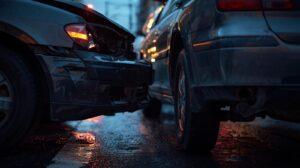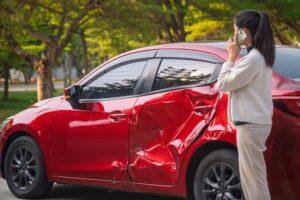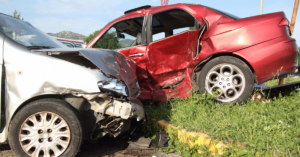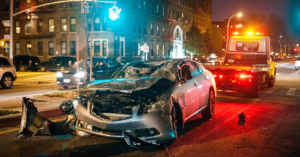Key Takeaways
-
Rear-end collisions are among the most common car accidents in Connecticut and Massachusetts.
-
The rear driver is typically at fault, but there are important exceptions.
-
Liability may shift if the lead driver brake-checks, stops suddenly, or drives negligently.
-
Comparative negligence laws can reduce compensation if both parties share fault.
-
An experienced Connecticut or Massachusetts car accident lawyer can help gather evidence and prove your claim.
📞 Free Consultation: Call 203-678-8272 to speak with a car accident attorney today.
For a free legal consultation, call 203-437-6190
Understanding Rear-End Collisions
A rear-end collision occurs when the front end of one vehicle strikes the back end of another. These accidents frequently result from:
-
Distracted driving (texting, eating, or adjusting the radio)
-
Following too closely (tailgating)
-
Sudden braking or unsafe lane changes
-
Hazardous weather or road conditions
Even at low speeds, rear-end accidents can cause serious injuries such as whiplash, back injuries, or head trauma.

Who Is Liable in a Rear-End Collision?
In most cases, the driver who rear-ends the other vehicle is found at fault. Traffic laws in Connecticut and Massachusetts require drivers to maintain a safe distance and be prepared to stop when necessary.
However, there are exceptions. The front driver may share or assume liability if they:
-
Brake-check or intentionally slam on their brakes
-
Suddenly stop or swerve without signaling
-
Reverse into another vehicle
-
Drive with defective brake lights
These scenarios are evaluated under each state’s comparative negligence laws, meaning both drivers’ actions are reviewed to determine the percentage of fault.
Click to contact our personal injury lawyers today
Comparative Negligence in Connecticut and Massachusetts
Both Connecticut and Massachusetts follow versions of comparative negligence law, which means:
-
You can recover damages even if you were partially at fault.
-
Your compensation is reduced by your percentage of responsibility.
For example, if you are found 20% at fault and your damages total $100,000, you would still recover $80,000.
An experienced attorney can help ensure fault is assigned fairly and that insurers don’t undervalue your claim.
Complete a Free Case Evaluation form now
Multi-Vehicle Rear-End Collisions
Chain-reaction accidents can involve three or more cars. In these cases, determining liability becomes more complex.
For example:
-
Vehicle A stops safely.
-
Vehicle B stops behind A.
-
Vehicle C fails to stop and pushes B into A.
Here, Vehicle C is typically at fault for causing the chain reaction.
A skilled accident lawyer will investigate using photos, dashcam footage, and police reports to identify who triggered the impact.
Brake Checking and Liability
“Brake checking” is when a driver intentionally slams on their brakes to intimidate another driver following too closely.
This act is illegal and often considered road rage.
If a brake-checking driver causes a collision, they can be held liable for:
-
Dangerous driving
-
Intentional misconduct
-
Reckless endangerment
Proving brake checking can be difficult without evidence, so it’s vital to preserve dashcam footage, eyewitness statements, and police reports.
Proving Liability in a Rear-End Accident
To prove fault in a rear-end collision, your attorney will collect and analyze key evidence, including:
-
Police reports and official accident records
-
Eyewitness statements
-
Dashcam or surveillance footage
-
Vehicle damage reports (showing rear vs. front impact)
-
Cell phone records (to prove distracted driving)
This evidence helps establish negligence and strengthen your claim for compensation.
What To Do After a Rear-End Collision
If you’ve been involved in a rear-end crash in Connecticut or Massachusetts, take these steps to protect your health and legal rights:
-
Move to a safe location and call 911.
-
Check for injuries and seek medical attention immediately.
-
Exchange contact and insurance information with the other driver.
-
Take photos of vehicle damage and the accident scene.
-
Get witness information and statements if possible.
-
Avoid admitting fault or discussing the accident with other drivers.
-
Contact a Connecticut or Massachusetts car accident lawyer as soon as possible.
Common Injuries in Rear-End Collisions
Rear-end accidents can cause serious physical injuries, including:
-
Whiplash and soft tissue injuries
-
Back and spinal cord damage
-
Traumatic brain injuries (TBI)
-
Fractures or broken bones
-
Nerve compression or herniated discs
Even if symptoms seem mild at first, always seek medical evaluation — some injuries develop hours or days after impact.
How Our Connecticut and Massachusetts Car Accident Lawyers Can Help
At Jonathan Perkins Injury Lawyers, our legal team will:
-
Investigate the cause of your collision
-
Collect and preserve evidence
-
Handle communication with insurance companies
-
Negotiate aggressively for maximum compensation
-
File a lawsuit if insurers refuse to settle fairly
Our attorneys serve clients across Connecticut and Massachusetts, including New Haven, Hartford, Bridgeport, Springfield, and Worcester.
Contact Jonathan Perkins Injury Lawyers Today
If you’ve been injured in a rear-end collision, you deserve to know your rights and options.
Our Connecticut and Massachusetts car accident attorneys will fight to hold negligent drivers accountable and recover the compensation you deserve.
📞 Call 203-678-8272 or fill out our Free Case Evaluation Form today.
We’re here 24/7 to help you get the justice you deserve.





